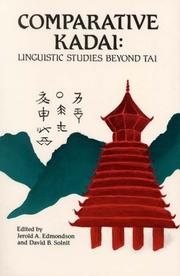| Listing 1 - 10 of 1308 | << page >> |
Sort by
|

ISBN: 3129073604 Year: 1975 Publisher: Stuttgart Klett
Abstract | Keywords | Export | Availability | Bookmark
 Loading...
Loading...Choose an application
- Reference Manager
- EndNote
- RefWorks (Direct export to RefWorks)
Book
ISBN: 0397473788 Year: 1978 Publisher: New York Lippincott
Abstract | Keywords | Export | Availability | Bookmark
 Loading...
Loading...Choose an application
- Reference Manager
- EndNote
- RefWorks (Direct export to RefWorks)
Book
Year: 1970 Publisher: Indianapolis : Bobbs-Merrill,
Abstract | Keywords | Export | Availability | Bookmark
 Loading...
Loading...Choose an application
- Reference Manager
- EndNote
- RefWorks (Direct export to RefWorks)
Book
Year: 1966 Publisher: Indianapolis : Bobbs-Merrill,
Abstract | Keywords | Export | Availability | Bookmark
 Loading...
Loading...Choose an application
- Reference Manager
- EndNote
- RefWorks (Direct export to RefWorks)
Book
ISBN: 9780199658398 0199658390 9780199544004 Year: 2012 Publisher: Oxford Oxford University Press
Abstract | Keywords | Export | Availability | Bookmark
 Loading...
Loading...Choose an application
- Reference Manager
- EndNote
- RefWorks (Direct export to RefWorks)
Book
ISBN: 1412362792 Year: 2008 Publisher: Chicoutimi : J.-M. Tremblay,
Abstract | Keywords | Export | Availability | Bookmark
 Loading...
Loading...Choose an application
- Reference Manager
- EndNote
- RefWorks (Direct export to RefWorks)

Abstract | Keywords | Export | Availability | Bookmark
 Loading...
Loading...Choose an application
- Reference Manager
- EndNote
- RefWorks (Direct export to RefWorks)
Book
ISSN: 09059857 ISBN: 8759397535 9788759397534 9788759314791 Year: 2009 Volume: 40 Publisher: Frederiksberg Samfundslitteratur
Abstract | Keywords | Export | Availability | Bookmark
 Loading...
Loading...Choose an application
- Reference Manager
- EndNote
- RefWorks (Direct export to RefWorks)
Book
ISBN: 8021085304 9788021085305 9788021075757 8021075759 Year: 2016 Publisher: Brno : Masarykova univerzita,
Abstract | Keywords | Export | Availability | Bookmark
 Loading...
Loading...Choose an application
- Reference Manager
- EndNote
- RefWorks (Direct export to RefWorks)
The monograph deals with the issue of the categories of state (predicative adverbs), which is a debatable point of contemporary Russian linguistics. In the center of interest are therefore indeclinable units that engage only in the predicate role of single-predicate sentences and express the state generally. The monograph completely describes how these words are represented and how they function in Old Russian texts from 12th to 17th century. The analysed units are viewed in lexical, derivative, morphological and syntactic terms. The complex research of such word is carried out in the confrontational diachronic and synchronic aspects of using data from Czech language.
Book
ISBN: 9781107183926 1107183928 9781316635209 1316635201 Year: 2021 Publisher: Cambridge, United Kingdom Cambridge University Press
Abstract | Keywords | Export | Availability | Bookmark
 Loading...
Loading...Choose an application
- Reference Manager
- EndNote
- RefWorks (Direct export to RefWorks)
"What is Language, and how do we study it? This is a big question, and it's the question that this textbook sets out to both show you and to actively engage you with. In the preface, we motivated the study of Language from a broad perspective - Language (with an upper case L, which we distinguish from language with a lower case L in the next section) is the means by which we engage the world and understand our place in it. Language isn't a random collection of sounds or symbols thrown from one person to another, but a predictable and patterned collection of specific elements that can be studied in a similar way to many other sciences, like biology, or chemistry, or physics. This chapter will address the two big questions above - What is Language? How do we study it? - in turn, setting the stage for the subsequent chapters, in which you will learn how to engage with language scientifically; that is, you'll learn how to think like a linguist"--
| Listing 1 - 10 of 1308 | << page >> |
Sort by
|

 Search
Search Feedback
Feedback About UniCat
About UniCat  Help
Help News
News